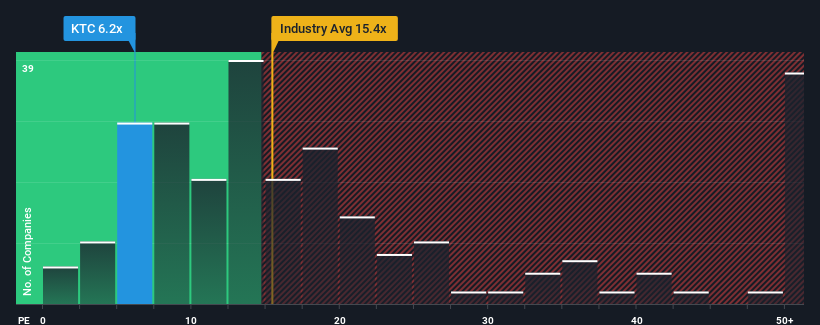- Malaysia
- /
- Food and Staples Retail
- /
- KLSE:KTC
Kim Teck Cheong Consolidated Berhad's (KLSE:KTC) Subdued P/E Might Signal An Opportunity
With a price-to-earnings (or "P/E") ratio of 6.2x Kim Teck Cheong Consolidated Berhad (KLSE:KTC) may be sending very bullish signals at the moment, given that almost half of all companies in Malaysia have P/E ratios greater than 15x and even P/E's higher than 25x are not unusual. However, the P/E might be quite low for a reason and it requires further investigation to determine if it's justified.
For example, consider that Kim Teck Cheong Consolidated Berhad's financial performance has been poor lately as its earnings have been in decline. One possibility is that the P/E is low because investors think the company won't do enough to avoid underperforming the broader market in the near future. If you like the company, you'd be hoping this isn't the case so that you could potentially pick up some stock while it's out of favour.
See our latest analysis for Kim Teck Cheong Consolidated Berhad

What Are Growth Metrics Telling Us About The Low P/E?
In order to justify its P/E ratio, Kim Teck Cheong Consolidated Berhad would need to produce anemic growth that's substantially trailing the market.
If we review the last year of earnings, dishearteningly the company's profits fell to the tune of 17%. Even so, admirably EPS has lifted 63% in aggregate from three years ago, notwithstanding the last 12 months. Accordingly, while they would have preferred to keep the run going, shareholders would probably welcome the medium-term rates of earnings growth.
Weighing that recent medium-term earnings trajectory against the broader market's one-year forecast for expansion of 16% shows it's about the same on an annualised basis.
With this information, we find it odd that Kim Teck Cheong Consolidated Berhad is trading at a P/E lower than the market. It may be that most investors are not convinced the company can maintain recent growth rates.
The Key Takeaway
Typically, we'd caution against reading too much into price-to-earnings ratios when settling on investment decisions, though it can reveal plenty about what other market participants think about the company.
Our examination of Kim Teck Cheong Consolidated Berhad revealed its three-year earnings trends aren't contributing to its P/E as much as we would have predicted, given they look similar to current market expectations. When we see average earnings with market-like growth, we assume potential risks are what might be placing pressure on the P/E ratio. At least the risk of a price drop looks to be subdued if recent medium-term earnings trends continue, but investors seem to think future earnings could see some volatility.
It is also worth noting that we have found 3 warning signs for Kim Teck Cheong Consolidated Berhad (1 is concerning!) that you need to take into consideration.
If you're unsure about the strength of Kim Teck Cheong Consolidated Berhad's business, why not explore our interactive list of stocks with solid business fundamentals for some other companies you may have missed.
Valuation is complex, but we're here to simplify it.
Discover if Kim Teck Cheong Consolidated Berhad might be undervalued or overvalued with our detailed analysis, featuring fair value estimates, potential risks, dividends, insider trades, and its financial condition.
Access Free AnalysisHave feedback on this article? Concerned about the content? Get in touch with us directly. Alternatively, email editorial-team (at) simplywallst.com.
This article by Simply Wall St is general in nature. We provide commentary based on historical data and analyst forecasts only using an unbiased methodology and our articles are not intended to be financial advice. It does not constitute a recommendation to buy or sell any stock, and does not take account of your objectives, or your financial situation. We aim to bring you long-term focused analysis driven by fundamental data. Note that our analysis may not factor in the latest price-sensitive company announcements or qualitative material. Simply Wall St has no position in any stocks mentioned.
About KLSE:KTC
Kim Teck Cheong Consolidated Berhad
Engages in distribution and warehousing of consumer packaged goods in East Malaysia and Brunei.
Adequate balance sheet and slightly overvalued.
Market Insights
Community Narratives


Recently Updated Narratives

Constellation Energy Dividends and Growth

CoreWeave's Revenue Expected to Rocket 77.88% in 5-Year Forecast

Bisalloy Steel Group will shine with a projected profit margin increase of 12.8%
Popular Narratives


MicroVision will explode future revenue by 380.37% with a vision towards success


NVDA: Expanding AI Demand Will Drive Major Data Center Investments Through 2026



